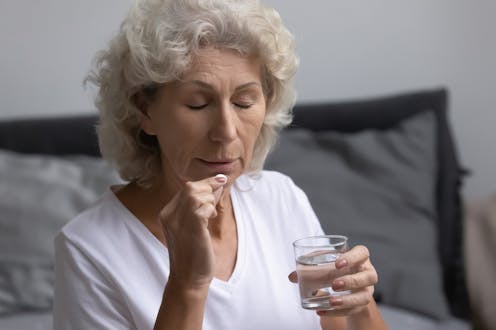
A drug that can halve the risk of developing breast cancer in post-menopausal women has been approved for use in the UK. This drug, called anastrozole, could benefit an estimated 289,000 women in the UK who are at increased risk of breast cancer.
Anastrozole was already approved for use in the UK as a breast cancer treatment. It belongs to a group of drugs called aromatase inhibitors that were first developed to treat breast cancer in women who had undergone menopause.
The key to anaztrozole’s success both in treating and preventing breast cancer, is due to its effects on the body’s oestrogen levels.
Up to 80% of all breast cancers produce a protein called the oestrogen receptor, which binds to the hormone oestrogen. When it binds, this protein tells breast cancer cells to divide. This overrides the normal controls that prevent cells from dividing too much – causing a tumour to grow. The more oestrogen circulating around the body, the more likely it is that tumour growth will be stimulated.
But anastrozole reduces oestrogen levels, preventing breast cancer cells from dividing. It does this by targeting a specific enzyme in the body.
Before the menopause, most of the body’s oestrogen is produced in the ovaries. But after the menopause, oestrogen is instead produced by an enzyme called aromatase. This oestrogen is typically made in our fat tissue. Aromatase produces oestrogen by converting other hormones – such as testosterone and androstenedione.
Anastrozole and similar drugs – such as letrozole and exemestane – stop aromatase from working and drastically reduce the amount of oestrogen in the body. This means that in post-menopausal breast cancer patients, the drug is very effective at stopping cancers which produce the oestrogen receptor from recurring after surgery or chemotherapy.

The reason anastrozole also works to prevent breast cancer is because often the earliest stages of normal breast tissue becoming cancerous depend on oestrogen. Indeed, many of the known risk factors for developing breast cancer – such as late menopause and obesity – are associated with increased oestrogen levels. But using anastrozole to reduce oestrogen levels can stop breast cancer before it even starts in at-risk post-menopausal women.
Preventative drug
Thanks to the new licence, post-menopausal women in the UK who are at moderate to high risk of developing breast cancer will now be offered the chance to take anastrozole to protect themselves. Women who have a family history of the disease should talk to their doctor about their risk and whether they could benefit from taking anastrozole.
It’s worth noting, however, that the drastic reductions in oestrogen levels caused by an aromatase inhibitor such as anastrozole are not without their drawbacks. Not only may it worsen menopause symptoms, it may also cause other side-effects – such as a decrease in bone density and increased risk of fractures. These side-effects can become more serious the longer the drug is taken. This is why it’s currently recommended that anastrozole is only taken for prevention for five years.
Women who are at increased risk of breast cancer and are considering using anastrozole need to be supported in making an informed decision that’s right for them. Women with osteoporosis or serious kidney or liver disease are particularly advised to discuss this decision with their doctor first.
In the UK, there are almost 56,000 new diagnoses of breast cancer annually. The NHS estimates that if just 25% of eligible patients opt to take anastrozole, then 2,000 breast cancer cases could be prevented each year in the UK.
Breast cancer is the most common cancer in the world. An estimated 2.3 million people – mainly women – will develop the disease each year. Preventing even a fraction of these cancers has the potential to save many lives and reduce suffering. Although anastrozole is prescribed off-label to prevent breast cancer in other countries, the UK is the first to license it for this specific use. Given the burden of breast cancer, it’s hoped that other countries will follow suit.
Sarah Allinson does not work for, consult, own shares in or receive funding from any company or organisation that would benefit from this article, and has disclosed no relevant affiliations beyond their academic appointment.
This article was originally published on The Conversation. Read the original article.







